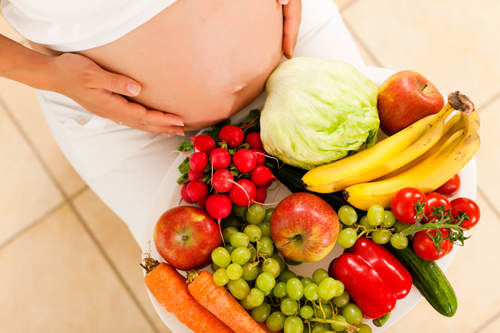During pregnancy, surrogate mothers in Oregon are eating for two. Eating a well-balanced diet not only provides your body with the vitamins and nutrients it needs to stay healthy, but provides the unborn baby with the nutrients he or she needs to grow and develop. Surrogate mothers need increased amounts of vitamins and minerals to support the health and growth of the unborn baby. Vitamin supplements are also recommended.
There are foods you should limit or avoid during pregnancy, especially foods that have been treated with pesticides, herbicides and other chemicals, but organic foods are foods that are produced without the use of synthetic pesticides or fertilizers. Meat and dairy products must not be produced using antibiotics, growth hormones, or feed composed of animal products in order to be considered organic.
Organic food is very expensive — often twice the price of the same, non-organic product. If you have a limited budget, eat only organic fruits and vegetables. The health benefits of organic meat, poultry, eggs, and milk are not clear. You can even cut corners by purchasing only certain organic fruits and vegetables that have not been exposed to large amounts of pesticide or herbicide. Traditionally, grapes, peaches, strawberries, winter squash, green beans, apples, spinach and tomatoes have high levels of pesticide. You can consume non-organic foods that have inedible peels, such as oranges, or have outer layers that can be removed, such as lettuce.
Supplement your diet with vitamins. Vitamins and minerals help you maintain good health. As a surrogate mother in *state*, your food is not only providing your body with nutrients, but also that of the unborn child. Usually a well-balanced diet provides all the vitamins and minerals you need, but surrogate mothers in Oregon often take a prenatal vitamin that contains folic acid and other vital nutrients needed during pregnancy. When choosing a vitamin or vitamins, make sure it contains folic acid, iron, and Docosahexaenoic acid, or DHA. Folic acid helps prevent nervous system disorders in the unborn child and protects mothers from cancer and stroke. Surrogate mothers in Oregon should ingest 600 mg of folic acid every day.
Eating a diet that consists of organic fruits, vegetables, whole grain, and dairy products and lean protein sources such as beans, legumes, poultry, low-fat red meat, and fish low in mercury will give your body the widest array of vitamins and minerals. A well-balanced diet also provides your body with fiber, which is necessary for intestinal health, and calcium and vitamin D, which promote bone strength for you and your baby. If you can afford it, you can switch your diet to organic foods to ensure better health and development for you and your baby.
[message/]






